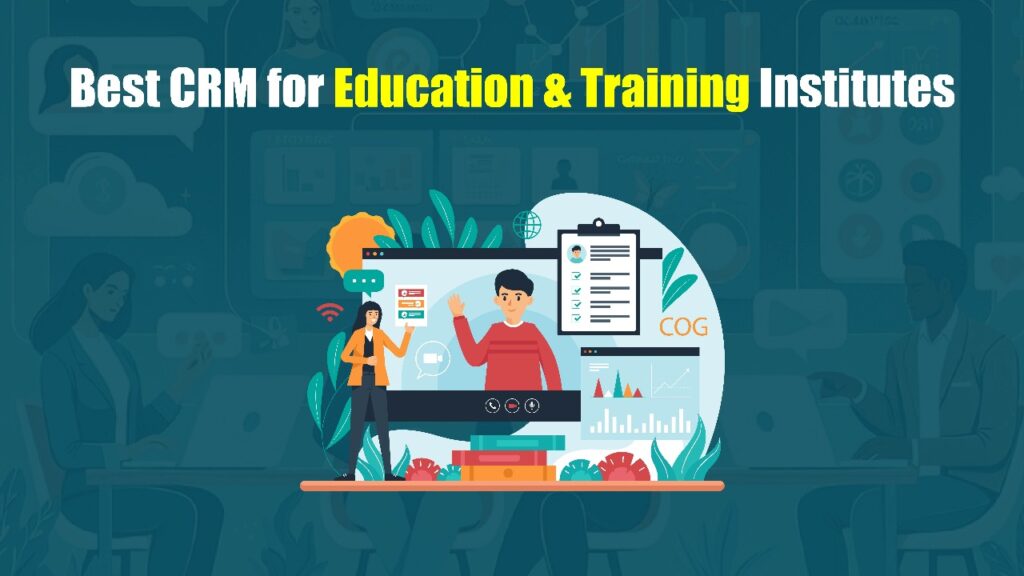Are you struggling to manage student admissions, course schedules, and trainee engagement all at once?
Are you looking for a way to streamline communication, automate routine tasks, and improve overall efficiency in your educational or training institute? In today’s competitive landscape, simply relying on spreadsheets or manual processes is no longer enough. A dedicated CRM for education and training helps you centralize student and trainee data, track progress, and maintain meaningful interactions throughout their lifecycle.
By leveraging a modern CRM platform, schools, universities, and training centers can increase enrollment, enhance student satisfaction, and optimize administrative workflows. The right system ensures timely follow-ups, better engagement, and improved institutional performance.
What is CRM for Education & Training?
CRM for Education & Training is a software solution designed to manage and optimize interactions with students, prospects, and trainees throughout their entire lifecycle. It centralizes data from admissions, marketing, communications, and training programs into a single platform. Educational CRMs help track inquiries, applications, enrollment status, and engagement history, providing a 360-degree view of each student or trainee.
Training-focused CRMs extend these capabilities to schedule classes, track course progress, and manage certifications. Essentially, it combines administrative efficiency with personalized communication, helping institutions make data-driven decisions, reduce manual workload, and improve overall operational effectiveness.
Benefits of CRM for Education & Training
- Streamlined Admissions Process: Track inquiries, applications, and enrollment with automated workflows, reducing administrative burden.
- Improved Student Engagement: Maintain personalized communication through email, SMS, and notifications to keep students engaged.
- Centralized Data Management: Store all student, trainee, and alumni information in one secure platform, ensuring accuracy and accessibility.
- Enhanced Marketing & Recruitment: Automate campaigns to attract prospective students and nurture leads effectively.
- Operational Efficiency: Automate routine administrative tasks like scheduling, follow-ups, and reporting.
- Data-Driven Decision Making: Use analytics and dashboards to understand student behavior, retention rates, and program performance.
Why Education & Training Institutes Need a CRM Today
Complex Student and Trainee Journeys
Students and trainees often interact across multiple channels — emails, phone calls, forms, or social media. A CRM centralizes all communication, ensuring every inquiry, application, or feedback is captured in one unified system.
Automation and Follow-Ups
Manual follow-ups are time-consuming and prone to errors. CRMs automate reminders, notifications, and course updates, ensuring prospective students never slip through the cracks.
Centralized Student & Course Data
Training institutes manage multiple courses, sessions, and instructors. A CRM keeps student records, course progress, and attendance in one place, simplifying operations and reporting.
Personalization & Engagement
With a CRM, you can remember student preferences, track their course interests, and deliver targeted messages. Personalized communication boosts enrollment and retention rates.
What to Look for When Choosing a CRM for Education & Training
- Student Lifecycle Management: Track admissions, enrollments, course progress, and alumni engagement.
- Lead Management & Enrollment Funnel: Capture leads, qualify them, and nurture them automatically through the enrollment process.
- Multi-Channel Communication: Email, SMS, WhatsApp, or chat integration ensures students are reached on their preferred platforms.
- Automation & Workflow: Automate reminders, batch updates, fee notifications, and follow-ups to save time.
- Analytics & Reporting: Track student engagement, course performance, and conversion rates to make data-driven decisions.
- Mobile Access: Enable staff to access student data, course info, and communication tools anytime, anywhere.
How We Selected the Best CRMs for Education & Training Institutes
Selecting top CRMs required evaluating platforms based on features tailored to educational and training workflows. Institutes need specialized tools for student management, course scheduling, and engagement campaigns.
Key Selection Criteria
- Education-Specific Features: CRMs that handle admissions, batch management, course tracking, and student engagement were prioritized.
- Ease of Use & Automation: Platforms offering intuitive dashboards, automated workflows, and communication templates ranked higher.
- Integration & Flexibility: Compatibility with LMS, email, calendars, payment gateways, and marketing platforms was critical.
- User Reviews & Reputation: We analyzed trusted review sites, case studies, and testimonials from educational institutes.
- Pricing & Scalability: CRMs with transparent plans, fair pricing, and scalability for both small and large institutes were considered.
- Support & Training Resources: Continuous support, onboarding, and training availability were a major factor for usability.
Top 10 Best CRM for Education & Training Institutes in 2026
Choosing the right CRM for education and training institutes in 2026 can be a challenge, especially when you need features that support both student lifecycle management and enrollment workflows. To simplify your decision, we’ve put together a curated list of the 10 best CRMs that blend automation, student engagement, marketing, and training management. These platforms are trusted by schools, academies, universities, and training centers to streamline admissions, boost retention, and scale operations efficiently.
Here is our curated list of the Top 10 Best CRM for Education & Training Institutes in 2026:
- Salesforce Education Cloud — Best for managing the complete student lifecycle in large institutions
- HubSpot CRM — Best for affordable automation and marketing for schools and training academies
- Slate CRM — Best for admissions-focused institutions and detailed enrollment tracking
- Ellucian — Best for colleges and universities needing deep student lifecycle management
- Zoho CRM — Best for small-to-mid training institutes needing a flexible, low-cost CRM
- Element451 — Best for admissions offices that want modern, configurable recruitment workflows
- Meritto — Best for recruitment and engagement in India-based education & training institutions
- Keap — Best for training academies wanting to automate outreach and follow-ups
- LeadSquared — Best for combining marketing, inquiry management, and application tracking
- Zendesk for Education — Best for managing student support and communication across channels
1) Salesforce Education Cloud
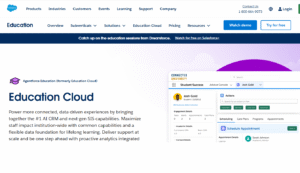
Overview
Salesforce Education Cloud is a powerful, enterprise-grade CRM designed for managing every phase of a learner’s academic journey. It unifies recruitment, admissions, student retention, alumni relations, and training operations on a single platform. With its highly customizable architecture, institutions can build workflows that reflect their unique processes.
The platform supports complex integrations with SIS (Student Information Systems), LMS (Learning Management Systems), and finance modules. It scales well from small colleges to large university systems. The data security and compliance standards make it reliable for handling student and training data.
Key Features
- Full student lifecycle management (admissions to alumni)
- Recruitment pipeline and lead nurturing
- Admissions workflow automation
- Integration with SIS / LMS systems
- Analytics and predictive insights
- Custom dashboards and reporting
Pros
- Extremely flexible and customizable
- Supports large-scale institutions
- Powerful analytics and forecasting
- Deep integration with third-party education tools
- Scalable for multi-campus / multi‑program setups
- Strong support and mature ecosystem
Cons
- Very high cost
- Implementation complexity is significant
- Requires trained staff or consultants
- Customization can lead to long delivery times
- Licensing and maintenance costs can escalate
Why Choose Salesforce Education Cloud
If you run a large university or training institution that needs to manage admissions, student lifecycle, and training programs all in one stage, Salesforce Education Cloud provides unmatched flexibility and scalability. Its powerful analytics and custom workflow capabilities allow you to build a system tailored to your exact needs.
With deep integration options, it connects with your existing LMS, SIS, and financial systems seamlessly. The platform supports recruitment, enrollment, ongoing student engagement, and alumni relations. For institutions that need enterprise-grade CRM combined with educational and training operations, it’s a top-tier choice.
Pricing
-
Pricing is custom / quote-based for Education Cloud depending on modules, number of users, and features.
2) HubSpot CRM
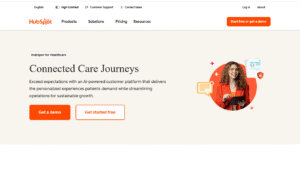
Overview
HubSpot CRM is a well-known, easy-to-use platform that works superbly for educational institutes and training centers that want to centralize marketing, student inquiries, and engagement. Even the free version of HubSpot offers strong tools for contact management, email sequencing, and pipeline tracking, making it ideal for institutions on a budget.
HubSpot can capture leads from forms on websites, live chat, and landing pages, helping schools and academies manage prospective students and trainees. The platform also lets teams build automated workflows that send follow-up messages and reminders. Reporting dashboards provide insights into lead conversion, campaign performance, and pipeline growth. Because of its clean UI and modular pricing, HubSpot is accessible for both small academies and larger training operations.
Key Features
- Contact and lead management
- Email automation & sequences
- Live chat and chatbot integration
- Deal / application pipeline management
- Landing pages & form builder
- Analytics and performance dashboards
Pros
- Very easy to get started
- Strong free plan
- Excellent for marketing + CRM combined
- Minimal technical training required
- Scales with institution growth
- Transparent, modular pricing
Cons
- Not built specifically for education or training needs
- Lacks built-in student information system (SIS) features
- Advanced features require paid plans
- Predictive analytics is limited
- Integrations with LMS may need setup
Why Choose HubSpot CRM
Choose HubSpot if your school or training institute needs an affordable, user-friendly solution to manage inquiries, automate outreach, and nurture leads. It’s perfect for small or growing training academies that rely on digital marketing to attract students.
The platform’s automation tools help send follow-up sequences, onboarding messages, and reminders, so your team doesn’t have to manually handle every lead. Reporting dashboards give visibility into how campaigns are performing, helping you optimize recruitment. With HubSpot, you can grow your operations without paying for unnecessary complexity.
Pricing
- Free: $0 / month
- Starter: $15 / user / month
- Professional: $50 / user / month
- Enterprise: $75 / user / month
3) Slate CRM
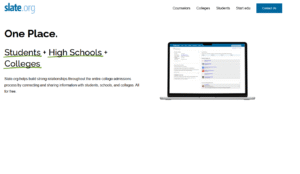
Overview
Slate CRM by Technolutions is a specialized platform built primarily for admissions and enrollment management in higher education. It combines CRM features with application management, communications, and data analytics, giving recruitment teams a complete view of prospective students. Slate helps admissions officers track inquiries, applications, interviews, and decisions in a single system.
Its communication tools allow personalized email campaigns, event invitations, and follow-up messaging tied to each applicant’s journey. It also supports application review workflows and committee management. Slate is used by many colleges and universities for its deep admissions-focused tools and data-driven insights.
Key Features
- Inquiry to application funnel tracking
- Application management & review workflows
- Personalized communication (email / events)
- Committee and reviewer coordination
- Event registration and follow-up
- Advanced data analytics and reporting
Pros
- Built specifically for admissions teams
- Highly specialized workflow tools
- Strong communications capabilities
- Deep data reporting and analytics
- Supports complex review processes
- Scalable for universities
Cons
- Very niche (less useful outside admissions)
- UI can feel dated for some users
- Customization is limited to admissions workflows
- Pricing can be high for smaller institutions
- Training required for staff
Why Choose Slate CRM
Slate is the best pick if your institution wants a CRM dedicated to admissions and enrollment. Its tools are built around recruitment, data-driven decision-making, and application management, so you won’t pay for irrelevant CRM features. Slate supports event-based outreach, personalized communications, and deep analytics, which helps recruiting teams make informed decisions.
It’s particularly suited for colleges, universities, or training programs that rely heavily on inquiries, applications, and interviews. If rising enrollments, better candidate engagement, and efficient admissions operations are your priorities, Slate is a top solution.
Pricing
-
Custom quote required — Slate does not publicly list standard pricing for its CRM + admissions platform.
4) Ellucian
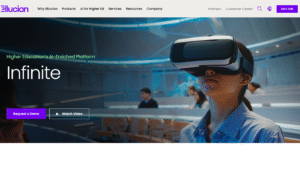
Overview
Ellucian is a comprehensive platform tailored for colleges and universities, offering CRM, student information system (SIS), and financial tools in one ecosystem. It supports the entire student lifecycle—from recruitment and admissions to retention, training, and alumni management. The CRM component integrates with Ellucian’s core systems to offer unified data for academic and administrative teams.
It can track prospect engagement, manage events, and automate communications. Training centers associated with universities can use Ellucian for coordinating student‐trainer relationships and scheduling. With powerful reporting and scalability, Ellucian is suited for large educational institutions.
Key Features
- Student lifecycle & recruitment management
- Admissions tracking and engagement
- Event and registration management
- Communications and marketing automation
- SIS / administrative system integration
- Analytics dashboards for retention and performance
Pros
- Deep integration with core academic systems
- Scalable for large institutions
- Comprehensive student lifecycle coverage
- Strong support and vendor maturity
- Good reporting for academic and admin teams
- Reliable for both education & training contexts
Cons
- High implementation cost
- Requires dedicated admin / technical teams
- Not highly agile for small or rapidly changing institutes
- Training for staff is essential
- Customization can be complex
Why Choose Ellucian
Ellucian is ideal for colleges, universities, and large training organizations that want a unified system for student management, admissions, and academic administration. Its deep SIS integration ensures data flows smoothly across academic and administrative functions. You gain a holistic view of your student population, recruitment efficiency, and retention efforts.
For training institutes embedded in higher education, Ellucian helps maintain coherence between academic curriculum and training workflows. If institutional maturity, data integrity, and long-term scalability are important to you, Ellucian offers a proven, institution-focused solution.
Pricing
-
Custom quote required — Ellucian does not publicly provide flat pricing for its CRM module.
5) Zoho CRM
Overview
Zoho CRM is a flexible, cloud-based tool that adapts well to both educational institutes and training centers. It centralizes lead management, automates follow-ups, and provides workflow customization without breaking the bank. Zoho’s interface is clean and accessible, allowing admissions or marketing teams to set up pipelines for prospective students or trainees easily.
It supports communication via email, SMS, and web forms, helping your team stay connected with prospects. Its reporting module offers insights into lead sources, conversion rates, and campaign effectiveness. Zoho’s mobile app ensures that staff can work on the go, whether in a training session or on campus.
Key Features
- Lead and pipeline management
- Workflow automation (tasks, follow-ups)
- Multi-channel communication (email, SMS)
- Web form integration for inquiries
- Custom dashboards & reports
- Role-based access control
Pros
- Very affordable for small-to-medium institutions
- Easy to tailor for education or training workflows
- Mobile enabled for remote teams
- Automation reduces administrative load
- Transparent pricing and scalable plans
- Strong community and ecosystem support
Cons
- Not specialized for academic record‑keeping (SIS)
- Predictive / student‑specific forecasting is limited
- Requires work to integrate with LMS or student systems
- Reporting may be less powerful than enterprise CRMs
- Some advanced features behind higher-tier plans
Why Choose Zoho CRM
If your training center or school is looking for a cost-effective yet powerful CRM, Zoho CRM is a top contender. It offers enough flexibility to model your recruitment, admission, and training workflows without the overhead of enterprise systems.
Its automation features help reduce repetitive admin tasks, letting your team focus on building meaningful relationships with students. Mobile access ensures your staff can work in the field, whether they’re recruiting or teaching. Combined with its clear pricing structure and scalability, Zoho is ideal for growing institutes that want to stay lean and efficient.
Pricing
- Standard: $14 / user / month
- Professional: $23 / user / month
- Enterprise: $40 / user / month
- Ultimate: $52 / user / month
6) Element451
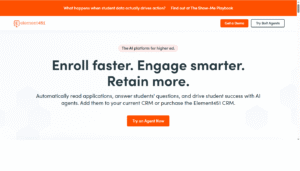
Overview
Element451 is a modern CRM designed specifically for admissions teams in higher education and training institutes. It focuses on recruitment, personalization, automated engagement, and journey-based marketing to help attract and convert prospective students. The platform allows institutions to build tailored communication workflows, score leads, and trigger outreach based on prospect behavior.
It also supports event registration, webinar invites, and automated follow-up communications. Its analytics engine gives insight into engagement performance, conversion rates, and ROI on recruitment campaigns. With its configurable design, Element451 supports both academic and training-oriented institute operations.
Key Features
- Journey-based recruitment automation
- Lead scoring & qualification
- Event and webinar management
- Personalized communications & drip campaigns
- Behavioral analytics & engagement tracking
- Reporting on recruitment KPIs
Pros
- Specifically built for admissions and recruitment
- Strong personalization options
- Helps convert and engage high-potential leads
- Great for event-driven outreach
- Insightful analytics on lead behavior
- Designed for both education and training contexts
Cons
- Not a full “student records” system (limited SIS)
- Pricing may be high for smaller institutions
- Requires onboarding and training for staff
- Custom automation can be complex to set up
- Limited offline / mobile data entry
Why Choose Element451
Choose Element451 if your focus is on recruitment and admissions rather than purely academic record-keeping. It empowers marketing and admission teams to run journey-based campaigns, score prospects intelligently, and engage them with personalized messaging.
The platform’s ability to trigger communications based on behavior means you can connect with prospects at the right time with relevant content. With analytics, you can learn which outreach strategies are most effective and optimize your recruitment ROI. For schools and training institutes aiming to scale their enrollment pipeline and stay competitive, Element451 offers a modern, recruitment-focused CRM built for growth.
Pricing
-
Custom quote required — Element451 does not publish standard pricing.
7) Meritto
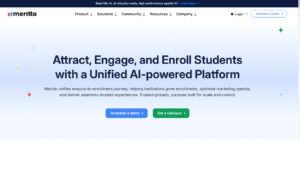
Overview
Meritto is a CRM tailored for education and training institutes, particularly popular in India, focusing heavily on prospective student recruitment and engagement. It centralizes inquiry handling, automated follow-ups, and lead scoring to help institutions manage their admissions funnel. The system supports multi-channel communication with prospective students, including email, SMS, and WhatsApp.
Meritto’s analytics module provides actionable insights into conversion rates, campaign performance, and outreach effectiveness. It also supports event management (open houses, webinars) and application tracking. For training centers, it helps convert leads into enrollments more efficiently by automating routine tasks.
Key Features
- Inquiry and lead management
- Multi-channel communication (email, SMS, WhatsApp)
- Event / webinar management
- Lead scoring & qualification
- Conversion analytics
- Application tracking
Pros
- Built for education recruitment in regional markets
- Very good for high-volume lead handling
- Localized support and features
- Automates follow-up processes
- Analytics help optimize recruitment strategy
- Suitable for both education and training institute workflows
Cons
- May not scale easily for international institutions
- Limited LMS or academic record management
- Custom features may need development
- UI could be more modern / user-friendly
- Pricing transparency is limited
Why Choose Meritto
Meritto is a smart choice if you’re operating in India or similar markets and want a CRM that understands local student recruitment dynamics. Its multi-channel outreach, lead scoring, and analytics help you engage prospective students effectively and convert them efficiently. Training centers benefit from its event management and application tracking features.
With its automated follow-up workflows, your admissions team can spend less time on manual tasks and more on building relationships. If regional relevance, efficient recruitment, and lead management are your priorities, Meritto fits the bill.
Pricing
-
Custom quote required — Meritto does not list public pricing.
8) Keap
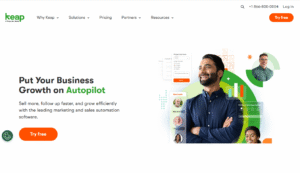
Overview
Keap is a CRM and automation platform well-suited for training institutes, coaching centers, and small educational businesses that want to automate communications, scheduling, and engagement. It handles contacts, tasks, appointment scheduling, and payment reminders in an integrated way. With customizable automation, Keap allows you to send follow-up messages, nurture leads, and manage student lifecycle without manual intervention.
Its interface is beginner-friendly, making it suitable for administrators who may not have strong technical skills. Keap also supports email and SMS campaigns, which helps training programs maintain contact with prospects and students. The platform is built for small teams focused on growth and retention.
Key Features
- Email & SMS automation
- Appointment scheduling and reminders
- Contact segmentation and tagging
- Task automation and follow-up sequences
- Payment and invoice integration
- Pipeline / lead management
Pros
- Highly accessible for non-technical users
- Affordable for small to mid-sized training centers
- Reduces repetitive administrative tasks
- Automates lead nurturing and retention
- Good for mixed marketing + sales use cases
- Helps maintain continuous student engagement
Cons
- Lacks advanced academic / SIS features
- Limited predictive or AI‑driven insights
- Not built for large-scale institutions
- May require integration for LMS / student systems
- Reporting is relatively basic
Why Choose Keap
Pick Keap if you run a coaching institute, small academy, or training business and want to offload routine tasks like scheduling, follow-ups, and billing. Its automation features help you nurture leads into enrolled students while minimizing manual work.
The user interface is intuitive, so your team doesn’t need to be very tech-savvy to use it. With email and SMS campaigns, you can maintain solid engagement with prospects and students. Keap helps growing institutions stay organized, reduce administrative burden, and scale outreach without complexity.
Pricing
- Lite: $79 / month
- Pro: $149 / month
- Max: $199 / month
9) LeadSquared
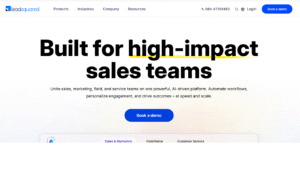
Overview
LeadSquared is a CRM built for sales, marketing, and admissions workflows, making it especially strong for training institutes, academies, and educational organizations. It allows you to capture inquiries, automate follow-ups, qualify leads, and track application status from one platform. The system supports multi-channel outreach with email, SMS, and web forms.
It also includes advanced analytics to measure campaign ROI, lead conversion, and funnel efficiency. Training institutes can use LeadSquared to monitor the performance of counselors, nurture leads, and streamline enrollment. With its scalable architecture, it adapts to the needs of both small and large educational organizations.
Key Features
- Inquiry capture & qualification
- Application / enrollment pipeline tracking
- Multi-channel outreach (email, SMS, forms)
- Lead scoring & segmentation
- Counselor / team performance dashboards
- Detailed analytics & campaign reporting
Pros
- Very strong for admissions and inquiry management
- Scalable for both small training centers and large institutions
- Helps improve lead-to-application conversion
- Good visibility into team performance
- Automates repetitive outreach tasks
- Detailed reporting for data-driven decisions
Cons
- Learning curve for new users
- Customization may require technical support
- Integration with SIS / LMS is not always straightforward
- Can get expensive at scale
- Some features are more sales‑CRM than academic
Why Choose LeadSquared
LeadSquared is ideal for education and training organizations that handle high volumes of inquiries and applications. Its robust pipeline and scoring tools help you prioritize leads with the highest conversion potential and track them through to enrollment. Training centers also benefit from performance dashboards for counselors and automated nurture programs.
The system supports outreach via SMS, email, and web forms, helping you stay connected across different channels. For institutes focused on scaling recruitment and managing their lead flow efficiently, LeadSquared provides a data-driven and automated CRM solution.
Pricing
-
Custom quote required — LeadSquared does not publicly list a universal plan for education/training CRM.
10) Zendesk for Education
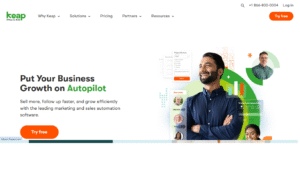
Overview
Zendesk for Education provides a streamlined way to manage student support, inquiries, and communications through a ticketing system designed for educational contexts. It centralizes emails, chat, and phone requests into one dashboard, helping student services, admissions, and training teams respond efficiently.
Zendesk enables you to create a knowledge base where students can self‑help with FAQs, reducing service load. The platform supports automation flows that route messages, escalate issues, and assign tickets to the right team. Analytics help you understand response times, volume, and common student issues. It’s a great CRM addition for institutions that prioritize support and student satisfaction.
Key Features
- Omnichannel ticketing (email, chat, phone)
- Knowledge base for self-service
- Automated routing & SLAs
- Custom workflows for different student services
- Team collaboration tools
- Analytics on ticket volume and satisfaction
Pros
- Excellent for handling high volume of student support
- Helps reduce burden on support teams
- Enables self-serve with knowledge base
- Scalable across departments
- Transparent tracking of response performance
- Adaptable to admissions, training, or student support teams
Cons
- Not a full student‑lifecycle CRM (limited admissions pipeline features)
- Lacks native academic / SIS integration
- Not designed for detailed application tracking
- Automation focused on support, not recruitment
- Advanced analytics may require add‑ons
Why Choose Zendesk for Education
Zendesk for Education is perfect if your institution wants to improve how it handles student inquiries, technical support, or training‑related questions. It centralizes communication across channels, so no student request falls through the cracks. The self‑service knowledge base empowers students to find answers and helps your team deflect repetitive queries.
Automation ensures tickets are routed and escalated based on priority and SLA. With reporting, you gain visibility into the most common issues and team performance, enabling you to improve your service operations continuously. For schools and training academies that want to boost support efficiency and satisfaction, Zendesk delivers with a strong, scalable platform.
Pricing
- Zendesk Support Team: $19 / agent / month
- Zendesk Suite Professional (Education-ready): $115 / agent / month
Conclusion
Selecting the best CRM for education and training institutes is crucial for improving efficiency, managing student relationships, and streamlining administrative workflows. A good CRM automates communication, tracks student progress, and simplifies admissions and enrollment processes. Platforms like Salesforce Education Cloud, HubSpot, and Zoho provide tailored solutions for institutes of all sizes.
Specialized CRMs such as Slate, Element451, and Meritto focus on student recruitment and engagement. Implementing the right CRM saves time, reduces errors, and enhances the overall student experience. In 2026, a smart CRM acts as a strategic partner, helping institutions grow and operate efficiently.
Frequently Asked Questions (FAQs)
What is a CRM for Education and Training Institutes?
A CRM for education and training institutes is a digital platform that helps manage student relationships, admissions, and communication. It streamlines administrative workflows and improves engagement with prospective and current students. Essentially, it acts as an all-in-one management tool for institutes.
Why do educational institutes need a CRM in 2026?
CRMs reduce manual administrative work, automate communication, and centralize student data. They improve enrollment tracking, engagement, and overall student experience. This allows staff to focus more on education and less on paperwork.
Which CRM is best for small educational institutions?
For small institutions, HubSpot, Zoho, and Keap are ideal due to their affordability, ease of use, and automation features. They simplify admissions, communication, and marketing without requiring technical expertise.
Can a CRM improve student engagement?
Yes, CRMs enhance engagement by sending automated reminders, follow-ups, and personalized messages. They track interactions and provide insights to help staff respond effectively to student needs.
What features should an education CRM have?
Key features include student lifecycle management, automated communication, enrollment tracking, analytics dashboards, and integration with other software. These features streamline operations and improve both recruitment and retention.
